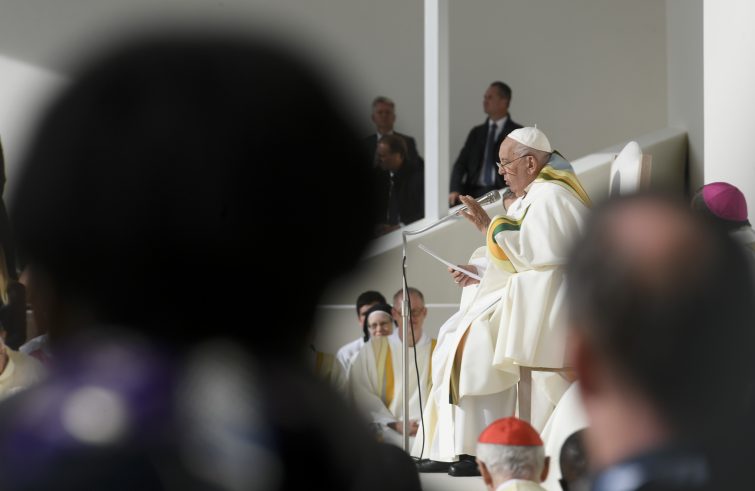
Pope Francis’s 46th apostolic journey was a pilgrimage imbued with the urgent imperative of peace. From Luxembourg, “a country with open doors”, one of the three official seats of the European institutions, Pope Francis addressed an entire continent scarred by war and seemingly oblivious to its history. The achievement of peace and the healing of this “dangerous syndrome” – was the Pope’s appeal to authorities – require “honest negotiations” and “honourable compromises, which undermine nothing and can instead build security and peace for all”, avoiding “useless massacres” with immense human costs, because “war is always a defeat.”
“We are close to a world war”
the Pope exclaimed during Holy Mass celebrated at the Brussels stadium, facing a crowd of 35,000 people, with a plea for a cease-fire in Lebanon.
A major theme of the visit was also that of the sexual abuse of minors by members of the clergy, which has inflicted wounds that are still far from healed, especially in Belgium. Just as on several previous international visits, Pope Francis asked to meet with 17 survivors of abuse and listen, for more than two hours, to their “cry that rises to heaven”. It was one of the unscheduled highlights of the visit, like the surprise visit to Saint Gilles where he met with the homeless, or the prologue of Holy Mass in the Brussels stadium, after having greeted 6,000 young people who were cheering him at the adjacent Palais the previous evening.
“Abuse generates atrocious suffering and wounds, undermining even the path of faith. And there is a need for a great deal of mercy to keep us from hardening our hearts before the suffering of victims”,
the Pope told members of the Belgian clergy in the Koekelberg Basilica of the Sacred Heart, reiterating his reference to abuse, after the meeting in the nunciature. “Thank you for the great effort you make to transform anger and pain into help, closeness and compassion”, the homage to the local church. At the end of his Apostolic Journey to Luxembourg and Belgium, during which he beatified Anne of Jesus, Bergoglio made another powerful statement at the stadium in Brussels, denouncing the abuse scandals, as he had since the beginning of the Journey:
“In the Church there is no room for abuse. I implore everyone: do not cover up abuse! I implore the Bishops: do not cover up abuse! Hold abusers accountable regardless of their status: layperson, priest or Bishop. Those who have been abused are a cry that rises up to heaven: we must not silence it by our indifference.”
Welcoming migrants and care for creation are two other themes Bergoglio has held dear since the beginning of his pontificate. In Luxembourg, the Pope outlined a “model” for ensuring the welcome of migrants and refugees throughout the continent; in Belgium, he praised the commitment of the University of Leuven in preserving and renewing a 600-year-old tradition. “For development to be authentic and integral, we must not plunder or degrade our common home. Likewise, we must not abandon peoples or social groups on the margins”, the Pope emphasized in his address to authorities in Luxembourg. In Notre Dame Cathedral, Francis reminded the Catholic community to remain faithful to its centuries-old tradition of welcoming, and “to continue to make your country a friendly home for those who knock at your door seeking help and hospitality.”
Addressing students – who wrote him a letter – at the French-speaking seat of the University of Louvain, Europe’s oldest Catholic university, Francis outlined the Church’s “ecological programme”:
“While we are in this world, we are meant to safeguard its beauty and cultivate it for the good of all, especially keeping in mind those who will come after us.” “Yet no development plan – he added – will ever succeed as long as arrogance, violence and rivalry are on our consciences and in our society. As long as markets are given pride of place, then our common home will continue to suffer injustices.” “Expanding boundaries and becoming an open space for humanity and for society”, is “the great mission of a university”, the Pope said, with a call to reject “intellectual weariness” or a “soulless rationalism” that we run the risk of falling once again into, “conditioned by a technocratic culture that leads us to it.”
In Belgium, Francis made a synthesis of that Europe that he has often referred to as “grandmother”, the Pope made an appeal to have more children, echoed since his first speech in Luxembourg,
one of the countries with the highest GDP in the world, because ” having wealth entails responsibility “. At the close of the Mass in the Brussels stadium, before a crowd of 35,000 people, Francis made the surprise announcement that he intended to speed up ive the beatification cause of King Baudouin, initiated in 1995, at whose tomb he had prayed with members of the royal family, Philip and Mathilde.










